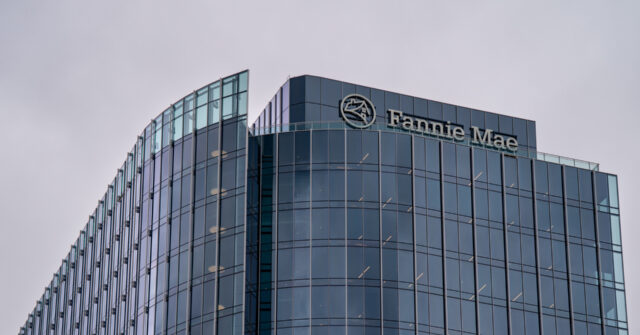President Donald Trump said Tuesday night that the U.S. government would retain its financial guarantees and oversight role over Fannie Mae and Freddie Mac, even as his administration explores a public offering for the two mortgage-finance companies.
“I am working on TAKING THESE AMAZING COMPANIES PUBLIC,” Trump wrote on his Truth Social platform. “But I want to be clear, the US Government will keep its implicit GUARANTEES, and I will stay strong in my position on overseeing them as President.”
The two companies, which guarantee and securitize roughly two-thirds of U.S. residential mortgages, have been under federal conservatorship since they were rescued during the 2008 financial crisis. They returned to profitability several years ago and now retain earnings under the direction of their regulator.
The prospect of privatization sent shares sharply higher, though it remains unclear whether a release would benefit holders of legacy shares predating the government takeover. Most credible plans for release would wipe out those shares. Fannie Mae rose as much as 13 percent in Wednesday morning trading, while Freddie Mac climbed as much as 17 percent. Both stocks are now trading at their highest levels since 2008.
Trump’s post signals that the administration is not planning a full withdrawal of federal support. A key concern among investors in mortgage bonds and stakeholders in the housing sector has been whether privatization would eliminate the government’s implicit guarantee on agency mortgage-backed securities—potentially raising borrowing costs across the housing market and perhaps crippling the companies altogether.
Prior to their collapse, Fannie and Freddie were widely considered to enjoy an “implicit guarantee” from the government. This allowed them to borrow at rates close to those of the U.S. Treasury and issue mortgage-backed securities considered free of credit risk. Both companies, along with their congressional backers, insisted there was no actual guarantee.
When they faced failure in 2008, however, it became clear the government was standing behind the companies. They were brought into conservatorship and bailed out with hundreds of billions of dollars in taxpayer support.
Trump’s post explicitly reaffirmed the “implicit guarantee”—a confusing policy koan. Can a guarantee be called implicit if it is explicit? A big question for investors ahead of any public offering is how much the companies would have to pay for that government backing—and how profitable they would be afterward.
Several hedge funds and investment companies, including those run by billionaire investors Bill Ackman and John Paulson, own significant stakes in the companies and stand to make billion-dollar windfalls if the release of Fannie and Freddie is structured to reward holders of the legacy shares. That, however, would likely require the government to forgo any further proceeds from the companies, essentially giving them away and surrendering the Treasury’s claim on their future earnings.
Earlier this year, Federal Housing Finance Agency Director Bill Pulte said that any transition out of conservatorship would need to be “carefully planned” to preserve market stability and avoid upward pressure on mortgage rates.
The administration has not yet released a formal plan for the public offering or a timeline for ending conservatorship.
Read the full article here


